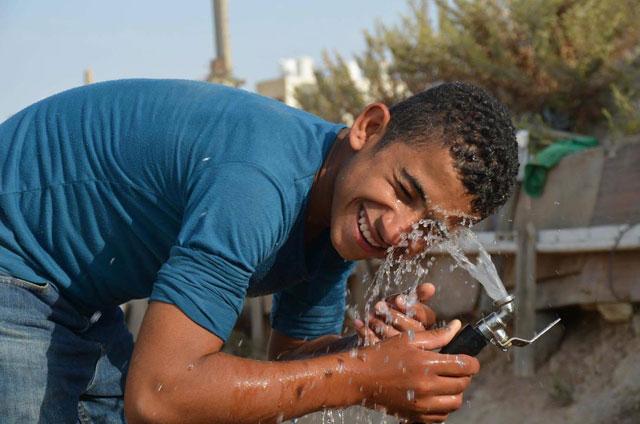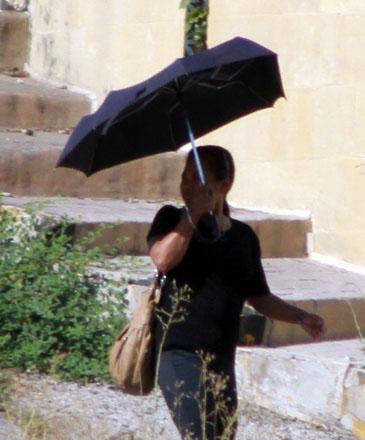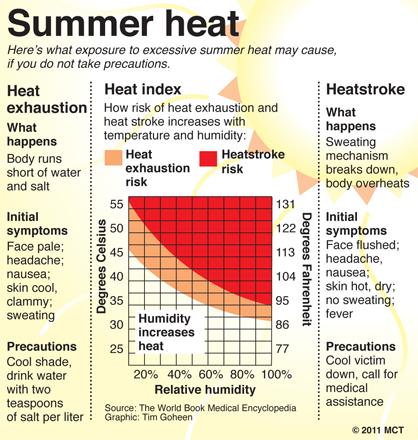You are here
Public advised to avoid direct sun exposure as temperatures soar
By Hana Namrouqa - Jul 31,2016 - Last updated at Jul 31,2016

Temperatures on Monday are expected to reach six degrees above the annual average of 33°C for this time of the year (Photo by Osama Aqarbeh)
AMMAN — Authorities on Sunday urged the public to avoid direct sun exposure as meteorologists forecast that temperatures would rise to the upper 30s.
The Ministry of Health and the Civil Defence Department (CDD) warned of the effects of hot weather on the elderly, children, people with chronic diseases, farmers and those working outdoors, stressing that sunstroke can occur when people are dehydrated after physical exertion in dry weather and under direct sunlight.
Heatstroke symptoms include a body temperature of 40°C or higher, altered mental states or behaviour, sweating, nausea, vomiting, flushed skin, rapid breathing, racing heart rates and headaches, according to the Mayo Clinic.
To treat a person with sunstroke, immediate action must be taken to cool the overheated person while waiting for emergency treatment.
The patient should be moved into the shade or indoors, excess clothing should be removed and the patient should be cooled with whatever means are available, the Mayo Clinic advises.
In a statement to The Jordan Times, the ministry and the CDD urged parents to prevent their children from playing outside during the hottest part of the day and to let them rest in the shade when tired, stressing that decreased sweating during hot weather is an indicator of the body’s immediate need for fluids.
Temperatures are expected to peak on Monday, when they are forecast to reach six degrees above the average of 33°C for this time of the year, according to Ayman Suboh, a meteorologist at the Jordan Meteorological Department (JMD).
The rise in temperatures started on Friday, when a hot air mass accompanied by a seasonal depression originating from the Indian subcontinent started affecting the country, according to the department.
“The air mass will continue prevailing until Wednesday, after which temperatures will gradually drop,” Suboh told The Jordan Times.
The weather on Monday will be hot in mountainous areas and very hot in the rest of the country, according to the JMD, which indicated that daytime temperatures will be 39°C, dropping to 26°C at night in Amman, while winds will be northwesterly moderate.
A slight drop in temperatures is forecast for Tuesday, but temperatures will remain above the average for this time of the year, according to the department.
Temperatures will range between a high of 38°C and a low of 26°C in the capital, as winds will be northwesterly moderate, the JMD said.
Another drop in temperatures is forecast on Wednesday, when the weather will be relatively hot in the mountains and hot across the country, the department said, expecting temperatures to be 35°C during the day, dropping to 26°C at night in the capital.
Meanwhile, the Ministry of Agriculture urged farmers to take precautions during the hot weather to prevent crop losses or deaths at poultry and cattle farms.
Farmers are advised to irrigate their crops more frequently during hot weather, while animal breeders should maintain certain temperatures and ventilation inside coops and barns and bee farmers should shade their hives, ministry spokesperson Nimer Haddadin said.
In addition, owners of poultry barns are advised to provide cold water mixed with vitamin C and to reduce the amount of fodder, Haddadin added.
Also on Sunday, the Labour Ministry warned against heat fatigue for workers who are directly exposed to the sun, such as construction workers, or those who are subject to high temperatures inside buildings.
In a ministry statement, spokesperson Mohammad Khatib called on employers not to expose their workers to direct sun, especially in the peak hours between 11am and 5pm, to cool interior workplaces, provide cold water and to allow employees to work in shifts,
As for safety procedures that workers themselves should take, Khatib said workers are advised to avoid open areas, drink more fluids to compensate those lost in sweating, use umbrellas and wear hats and sunglasses.
Related Articles
AMMAN — Temperatures on Sunday will be eight degrees above their annual average of 32°C as the impact of a very hot air mass is forecast to
AMMAN — Three people were treated for sunstroke in Jerash on Monday, as temperatures exceeded 40°C in several areas around the Kingdom.Jeras
AMMAN — The country will be affected as of Saturday by a heatwave which will push temperatures seven degrees above their annual average for













